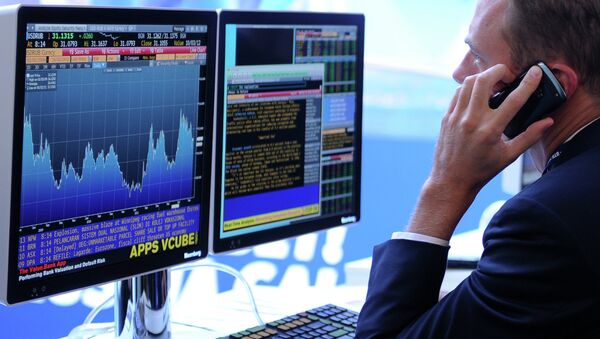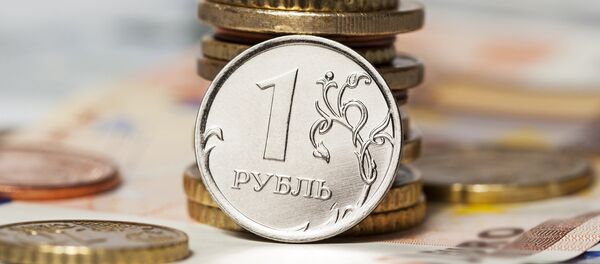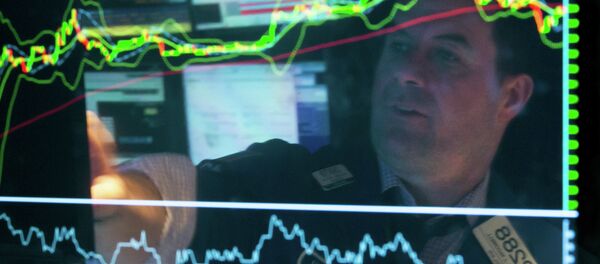Kristian Rouz — Stock markets extended gains late Thursday and early Friday, capitalizing on the advance in energy shares on Wall Street, while the ever-strengthening dollar pushed most of Asia’s open markets up. Mainland China’s bourses hit record highs after softer inflation data prompted more policy action from Beijing, while Europe advances on a weaker euro and the newly-found oil fields in the UK.
Wall Street ended its Thursday trading in the green, mainly due to significant advances in the energy sector, after earlier that same day the UK announced the discovery of a 100-bln bbl field of crude, sending its own energy shares up 200%. In America, shares in Andanarko Petroleum added 3.2%, and Marathon Oil rose 2.9%.
The Dow rose 0.31% and the S&P 500 Index added 0.45%, while Nasdaq advanced 0.48%. The dollar rose as well on the hawkish commentary from the US Federal Reserve, pledging it still might introduce a hike in its base interest rate in June, despite the recent growth concerns. The situation in the US economy, however, is becoming slightly more unbalanced as indicated by yields on the 30-year Treasuries, edging up this week to 2.597%. The Fed clearly stated the retail data, to be published next week, will be a determinant whether the rate hike will happen in June or later.
In Asia-Pacific, the MSCI’s broader index of shares outside Japan rose 0.4%, heading for a 3% weekly gain. A stronger dollar contributed to advances in Korea, the Republic of China (Taipei) and Japan, with the latter’s Nikkei 255 Index hitting a 15-year high of 20,000 points during the day, ending 0.2% down though.
The Nikkei Index gained 2.4% this outgoing week. The broader Topix Index was 0.3% down, posting a weekly gain of 1.6%. Japan’s retailers posted the biggest gains on Friday, with Fast Retailing adding 2.5% and Aeon jumping 5.5%, having beaten yearly profits estimates. These figures suggest consumer spending in Japan is building up, a good sign for inflation, growth and the overall economic performance. However, weighing on the major indices, utilities and pharmaceuticals were down Friday, with Kansai Electric Power down 2%, and Eisai, the drugmaker, down 5%.
Chinese stocks are gaining momentum as the Communist nation’s real economy is faltering, prompting speculation of a full-scale stimulus to be introduced soon. The Shanghai Composite index nearly doubled over the last 12 months, having risen 89%. Meanwhile, the real economic growth in China has fallen form an annualized demography-determined ‘normality’ of 8% to below 7%, with the nation nearing deflation and suffering from a weak demand for industrial goods.
The Shanghai Composite added 1.9% Friday, ending the week 4.4% up, after the macroeconomic data arrived showing inflation at 1.4% year-on-year, 0.1% above the anticipated. The producer-prices index fell 4.6% against 4.8% in February. Consequently, energy and material equities pushed the CSI 300 Index up 1.8%. Commodities stabilized as growth figures have proven slightly stronger than expected, while the still-weak overall performance suggests Beijing will start a bond-buying program this year. The Shenzhen Index soared 2.5% due to advances in the tech sector.
In Europe, the broader FTSEurofirst Index of top across-the-continent shares added 0.4%, surpassing its 15-year high in early Friday trading, as the euro continues its decline against its major peers, falling to $1.0637, its lowest since March 19. The robust growth in Germany, pushing the whole Eurozone up, the easing of the Greek debt concerns, and the newly-found oil in the vicinity of London’s Gatwick airport have been major factors behind the European markets’ rally.




